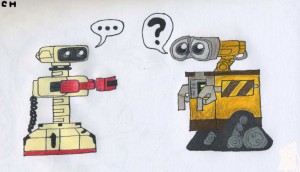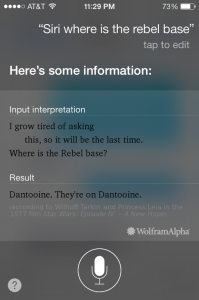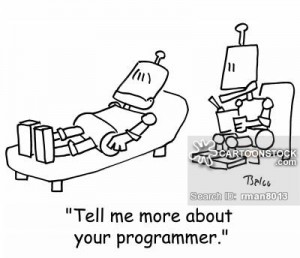Blame it on an over-active imagination (or too many cartoons as a kid), but I’ve always had a mild obsession with the potential of artificial intelligence. Much like Carla Diana, I spent much of my childhood fantasizing about the chance to interact with futuristic robot friends that walked, talked, functioned in my absence, and most importantly, comprehended what I told them and had valuable things to say in return. However, unlike the C3PO-esque droids of my imagination, I instead found myself surrounded by robots that were boasted as being “smart”, but yet could usually only fulfill a specific, singular function. R.O.B., Poochie, RoboReptile… these were all excellent toys, but nothing in comparison to the idealistic robots and androids that existed in my head.
Much like myself, Diana’s woes in “Dreams of Intelligent Robot Friends” stems from the fact that despite the face, blinking lights, and high tech properties, the limits to the quality and quantity of interactions one may have with objects like Karotz still leaves much to be desired. In retrospect, it seems that the defining factors that these toys “lack” are the ability to emulate human interactions, specifically a two-way channel of information exchanging. But where does this intrinsic value for human-like qualities lie? What is it that we define current “intelligent objects” by, and to what extent do current standards apply to the “ideal” concept of these robots?
Focusing on these questions made me consider one of the most relevant “smart” objects in recent history: Siri. Apple’s personal assistant,is often regarded as a modern cultural icon, often colloquially referred to as a “she” in everyday conversations.(http://www.cultofmac.com/259040/siri-predicts-opening-gates-hell/). In regards to Diana’s article, I would argue that defining characteristic of interpersonal connections with “smart objects” is their proficiency for expressing information such in a way that can be interpreted as having a “personality”. Specifically, Diana’s suggestion of “With the right predisposition, the appropriate context for a social exchange, and enough key info to grab onto, you and a stranger can hit it off right away”, perfectly explains why interactions with this technology can produce a sense of connection on personal, and even emotional levels. Simply put, we value Siri over something like Karotz because “her” ability to decipher interactions and potentially respond with both results and adequate emotional cognition quite literally makes us feel more “understood”.
To elaborate further, I’d like to cite a very personal, very nerdy example: Shortly after my first iPhone purchase, I jokingly asked, “Siri, where is the rebel base?” and was responded with a clunky robotic voice saying “Dantooine…They’re on Dantooine”. I was floored. I literally screamed “I love this fucking phone!” out loud. And while catching a point of reference is an admittedly shallow reason to love something, I think this scenario purely encapsulates how and why artificial intelligence can be so personally fulfilling. It stems the same strange psychology that causes Roombas to make cleaning more enjoyable, or when we can feel oddly remorseful that siri is “offended” by our profanity. They’re essentially human interactions, just emulated differently.
It’s indisputable that humans share many emotional ties with their objects, and though we are far from objects that act as sentient beings, perhaps even just the opportunity for more, emotionally stimulating interactions with them, can be incredibly rewarding in itself.




So after reading your post, I pulled out my iPhone and asked Siri how she felt about my beloved Alabama football team losing yesterday, and she responded, “don’t even get me started;” therefore, I couldn’t agree more with your sentiments pertaining to Siri. While I enjoyed your blogpost, I cannot fathom how anyone can knowingly want to interact with robots after watching IRobot and the Transformers franchise. The closes I could ever come would be hanging out with Ted, and I don’t really think he qualifies as a robot. And not because of his fondness of weed or women… okay maybe women, but he’s just a cool, scary, teddy bear. Who wouldn’t want to hangout with him? I wouldn’t have to worry about him trying to kill me, like,for instance: Megatron . I am all for developing robots for the sake of technology, but lets not give them the abilities to rise up and take over!!
I am a die-hard Star Wars fan and have probably seen it a thousand times, especially since I grew up on it (this Star Wars love is inherited from my Daddy). So I have thoroughly enjoyed your reference to Star Wars in conjunction with the Blog Post. Although, I can not formulate something to ask Siri…my creativeness disappears when asking a question to a machine, for some reason. Does this mean I do not have the capability or mind set to become personable with Artificial Intelligence? However, I do find myself pondering whether my toys do “come to life” just like in Toy Story. Hmmm…
“The way I define ‘intelligent design’ is that when people started out, we wanted to make sense of the world we lived in, so we created stories about how things worked.”
–George Lucas